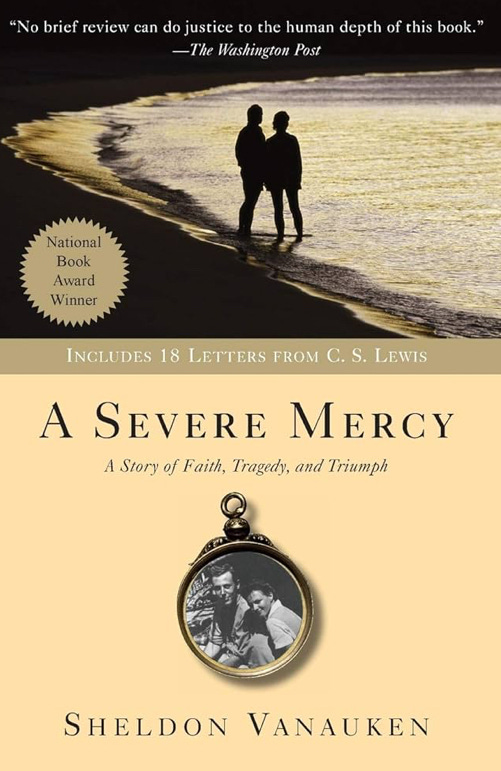“We would have tea and crumpets by the fire, and we would talk, always talk: talk about the University, talk about books, talk about our work…And talk about Christianity. We didn’t mind talking about it: that’s what Oxford is, a place to talk about everything.”
Sheldon Vanauken, A Severe Mercy
Welcome back fellow readers,
I have more recommendations to share today, and these selections are perhaps two of my favorite memoirs. Like last week, they are coming-to-faith stories from reluctant converts but with an added distinction: both memoirists grapple with and come to faith while attending Oxford University.
I am not an academic nor do I consider myself an Anglophile, but like many, I have drawn deeply from the rich literary and spiritual heritage of England. And as a person of faith, the influence of C.S. Lewis alone binds my heart and imagination to Oxford.
Perhaps it’s reductive, but the opening quote embodies my romanticized idea of the academic atmosphere of Oxford University. Fireside chats with tea and crumpets indeed. Nonetheless, both of today’s memoirs unfold much as the quote suggests.
Sheldon and Davy Vanauken in A Severe Mercy, and Caroline Weber in Surprised by Oxford, come to the famed city, talk much about books and the University and Christianity.
And as a result, all three come into the fold.
A Severe Mercy ~ Sheldon VanAuken
“It was death—Davy’s death—that was the severe mercy. There is no doubt at all that Lewis is saying precisely that. That death, so full of suffering for us both, suffering that still overwhelmed my life, was yet a severe mercy. A mercy as severe as death, a severity as merciful as love.” Sheldon Vanauken, A Severe Mercy
While this title indeed shares the story of two reluctant converts, this is not primarily a book about coming to faith, rather it is a love story. I said that about last week’s memoirs, too. Perhaps every story is one of love at its heart. But in this case, Sheldon Vanauken’s memoir is actually centered around a marriage—and a rather remarkable one at that.
The narrative follows Sheldon and his wife Davy through their courtship and marriage and an extraordinary commitment to the pursuit of life, love, and beauty together. Such is the ferocity of their commitment, that they vow to eliminate any perceived threats to their relationship by erecting “The Shining Barrier—the shield of our love.”
After serving in the war, attending Yale, and teaching in Virginia, an opportunity opens for Sheldon to study at Oxford. The couple moves to England and meets, much to their surprise, a group of intellectual and winsome Christians. Prior to arriving at the University, readers are privy to a bias against Christianity in both Sheldon and Davy, but also questions and lapses of doubt that surface along the way.
Now, engaging with their friends of faith, new questions arise. In response, they find the works of C.S. Lewis and indulge themselves fully in his writings. As contemporaries, eventually Vanauken reaches out to Lewis and a highly influential correspondence begins. The consequence: Sheldon and Davy become Christians.
Yet even after full acceptance of the tenets of Christianity, Vanauken struggles with his newfound label. He’s almost incredulous to find himself a believer.
I appreciated the honesty. As someone who derided Christianity—even mocked it—before I came to faith, I first found myself wrestling with how to share Christ with those who knew me prior.
It’s not what you think, I was tempted to say in excuse for my faith’s reputation.
And it wasn’t.
But at some point, one must accept being misunderstood as part of following the Shepherd. A servant is not greater than his master, after all.
Vanauken is also honest about his struggle with Davy’s love for God; it’s all consuming and in his mind threatens “The Shining Barrier.” But after returning to the States, Davy becomes terminally ill—and God takes away the very thing that Sheldon loves more than Him.
Through continued correspondence with C.S. Lewis, he is provided an encapsulated term for God’s allowance—and the title for the book: A Severe Mercy.
The phrase indeed reads severe, but grappling with the idea of an exacting mercy provides relief for Vanauken. I first read this memoir several years back when I was wrestling with the kindness of God, and I found companionship and similar relief in its pages.
This book is beautiful and transparent truth telling, and C.S. Lewis fans will love the excerpts of letters to Vanauken.
Surprised by Oxford ~ Carolyn Weber
“I’m like an addict when it comes to books. Compelled to read, understand, savor, wrangle with, be moved by, learn to live from these silent companions who speak so loudly. Surely some language must have a word for such a ‘book junkie’?
A Christian…? The term crossed my mind.” Carolyn Weber, Surprised by Oxford
Some fortyish years after Sheldon and Davy walk the streets of Oxford, another scholar and skeptic comes to the University. Carolyn Weber also enters life at Oxford disdainful of Christianity, and like the Vanaukens, meets thoughtful, winsome Christians who help pave the way to a changed heart.
I love the above quote by Weber, because this is the woman you encounter in her memoir: A woman compelled to wrangle and understand and search out truths. A wrangling and searching that eventually leads her to Christ.
The second part of the quote, her thought that such a “book junkie” could be labeled a Christian came before her conversion.
Of course, I love this, too.
Not only because I’ve found that such grapplers and seekers often find themselves face-to-face with Christianity, but also because people of faith ought to be those who seek to read, savor, and understand.
Like the Vanaukens, Carolyn’s story also involves a love relationship, though of a different nature. Weber meets her husband-to-be at Oxford but in her case, he’s already a believer. What ensues is a bit of a tumultuous friendship given her disdain for his beliefs. However, the progression of their relationship as her faith unfolds makes for a wonderful subplot of the story. And in fact, the entire book reads like a novel.
To sum up, I will point you to this interview with The Gospel Coalition in 2011. Weber goes into more depth than I can afford in this short post and if the memoir is new to you, I think it will further compel you to pick it up.
That wraps up today’s recommendations, friends. More to come next week!
As always, be blessed in books.
Tiffany






